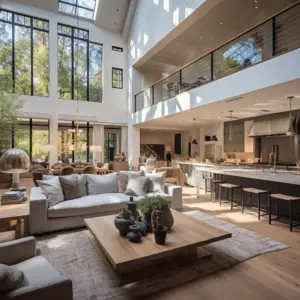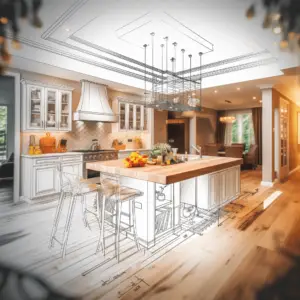Table of Contents
Introduction to Home Renovation
Home renovation is a process that gives homes a new lease on life. It’s about updating, modifying, or improving features to make them better, more attractive, and worth more. It could be anything from modernizing interiors to fixing up plumbing and electrical systems.
Before you begin, plan carefully. Consider your current needs and what you want your living spaces to look like. This will help guide decisions about design, materials, and layout. It’s also important to make sure your budget fits with your aspirations.
Renovations involve several stages. First, demolition of existing elements. Then, construction of new features, like walls or room expansions. This can involve contractors or carpenters.
Ancient Rome was full of wealthy people remodeling their places. They had gardens, fountains, and mosaics to show off their wealth. Craftsmen used sophisticated techniques to make these projects look amazing.
Factors to Consider Before Starting a Home Renovation

Prior to commencing a home renovation project, it is essential to consider numerous aspects that can affect its success. Such factors include: budget, timeline, design concepts, permits and regulations, contractor selection, and potential issues during the process. Thoroughly evaluating these will guarantee a pleasurable experience that meets your needs.
As an example: A couple planned to renovate their kitchen, yet failed due to not having enough funds. This caused a pause in the project and additional expenses. Had they assessed their financial capacity first, they could have avoided these problems and had a smoother renovation process.
Therefore, take into account these factors when starting a home renovation project to ensure a successful outcome. No pain, no gain… and no crooked walls either!
Types of Home Renovation Projects
Home renovation projects offer a huge range of transformations, from minor updates to complete makeovers. You can customize your space to fit your needs and style. Let’s take a look at some common types of home renovations and their advantages.
- Kitchen Remodeling: Update your cooking area with new appliances, cabinets, and paint. This not only makes it more attractive, but also boosts its functionality.
- Bathroom Renovation: Give your bathroom a spa-like feel by replacing the tiles, fixtures, and amenities. This adds value and improves comfort.
- Basement Conversion: Transform an unused basement into a living area or entertainment zone. Finish the walls, flooring, and lighting to create a cozy space.
- Outdoor Renovation: Extend your living space outdoors with a patio or deck. Enjoy meals or host gatherings with friends and family.
More ideas? Create an extension, a multi-purpose room, or incorporate eco-friendly features. The possibilities are endless to customize your home.
Did you know? In 2019, the Joint Center for Housing Studies of Harvard University found that US citizens spent over $350 billion on home renovations. That shows just how much people care about improving their spaces!
So, if you’re looking to personalize your house, pick a renovation project that works for you. With proper planning and execution, you can turn your home into your dream haven.
Tips for Hiring a Home Renovation Contractor
When you want to hire a home renovation contractor, it’s important to make the right choice. Here are some tips to help you:
- Research and ask around: Do your homework. Ask friends and family for recommendations or search online for reputable contractors.
- Check credentials and references: Before hiring, make sure they’re licensed and insured. Ask for references from previous clients to get an idea of their work quality and reliability.
- Get multiple quotes: Don’t go for the first contractor. Get quotes from at least three different ones and compare them.
- Communication is key: Pay attention to how well the contractor listens and communicates during initial consultations. Clear communication ensures a smoother renovation process.
- Trust your instincts: Ultimately, trust your gut feeling. If something doesn’t feel right, keep looking for someone you’re completely comfortable with.
An extra tip: Ask potential contractors if they have experience with similar projects. This can provide an added level of confidence in their ability to handle your needs.
Take action now and find the perfect contractor. Start researching and reaching out – you’ll be closer to getting your dream home transformation. DIY home renovation: bond with your loved ones while questioning your life choices.
DIY Home Renovation Tips and Tricks
Make your home look new! Here are some tips:
- Repaint walls and cabinets to give them a fresh and updated look.
- Upgrade fixtures and hardware in the kitchen and bathroom to modernize the space.
- Create storage space with shelves to keep your home organized and clutter-free.
- Revamp the outdoor area with landscaping to enhance its beauty and create a welcoming atmosphere.
- Use reclaimed materials for a sustainable touch that adds unique character to your home.
- Incorporate vintage pieces for an eclectic and charming vibe.
- Play with textures and patterns to add visual interest and dimension to your living spaces.
- Personalize your home with artwork and photos that reflect your style and personality.
- DIY home renovations can be stunning with creativity and dedication.
- Renovate with a plan – like a puzzle!
Common Home Renovation Mistakes to Avoid
When doing a renovation, it’s smart to avoid mistakes that can cause problems. Here are some important points:
- No planning: Don’t rush into it. Research, set a realistic budget and decide your goals first.
- Underestimating budget: Leave room for extra costs. It’s better to be ready than run out of money.
- Inexperienced contractors: Do research, check references and hire professionals who know what they’re doing.
- Aesthetics only: Beauty is important, but don’t forget practicality. Consider materials and design carefully.
Plus, make sure to get all necessary permits before starting. Fines or having to undo work could be the result.
Let’s look at an example of failing to follow these rules. A couple didn’t do their homework and had a lot of setbacks and bad workmanship. The project took longer and cost more than expected. This shows why it’s important to avoid these mistakes to have a successful renovation.
Want to save money and the environment? Renovate sustainably – where eco-friendly meets affordable.
Sustainable Home Renovation Ideas
Revamp your house in an eco-friendly way by using these 5 impactful ideas:
- Swap old appliances for energy-efficient ones.
- Install solar panels for renewable energy.
- Insulate to control temperatures.
- Use recycled materials for construction.
- Set up a rainwater harvesting system.
For further sustainability, think about:
- Low VOC paint for cleaner indoor air.
- Smart home technology to monitor energy usage.
Be part of the sustainable movement! These ideas will make the world greener and improve your house’s worth. Plus, enjoy long-term cost savings! But don’t forget the permits and regulations when renovating your home.
Importance of Permits and Regulations in Home Renovation
Obtaining permits and adhering to regulations are key for any home renovation project. This helps with safety standards and legal requirements. Ignoring permits can lead to fines, delays or even undoing completed work.
Permits protect homeowners by ensuring the work is done by licensed professionals. Proof of insurance and qualifications are needed, which reduces the risk of hiring unqualified individuals.
Permits also maintain the quality and integrity of a neighborhood. They help to prevent unsightly or unsafe modifications that can affect property values or the character of the area. Builders must follow guidelines to respect the environment.
Permits and regulations streamline the renovation process by providing a communication framework between homeowners, contractors and local authorities. Clear expectations such as project timelines, noise restrictions, waste management, and other considerations help to prevent disputes.
According to Houzz.com, not obtaining permits was one of the top ten mistakes made during home renovations. It’s important to consult with professionals and get all necessary permits before beginning a renovation.
Adding Value to Your Home through Renovation

Revamping your home can really raise its worth! Here are six things to mull over:
- Focus on the kitchen: A new and useful kitchen is a big selling point!
- Upgrading bathrooms: Fit it out with top-notch fixtures and finishes for more value.
- Boost curb appeal: Make a great first impression with landscaping, a new front door, or a lick of paint.
- Add living space: Convert the attic or basement into usable space to increase square footage.
- Energy-efficient upgrades: Install energy-saving appliances and insulation to win over eco-conscious buyers.
- Smart home tech: Integrate smart features like automated lighting or a security system.
Apart from these, there are special details to think about when refurbishing your home. For example, use sustainable materials to add value, and appeal to environmental buyers.
To maximize the impact of your remodel, here are some tips:
- Neutral colors throughout the house to please many buyers.
- Quality fixtures and finishes that last.
- Open floor plans to make it feel spacious.
- Built-in organizers and closets to improve storage.
- Professional advice before making structural changes.
By following these, you can greatly increase the value of your home and create a place potential buyers will adore!
Conclusion: Transforming Your House into a Dream Home through Renovation
Renovating your house can help you achieve your dream home. Think of your budget, timeline, and desired outcome. Assemble a team of professionals to bring your ideas to life. Expect some disruptions and inconveniences during the process. Don’t forget to get local permits and inspections. Research found 87% of homeowners enjoyed their renovations more after completion.


